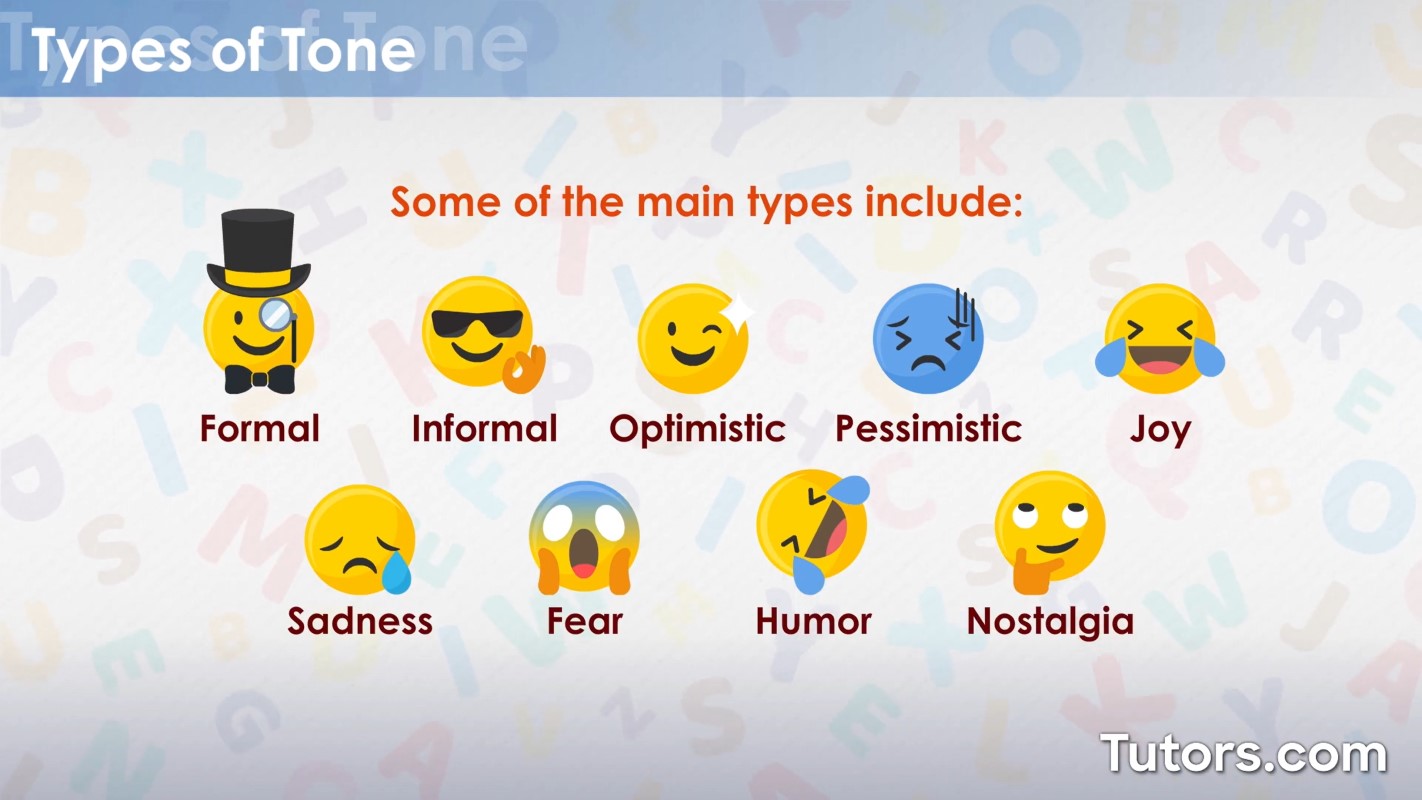Tone — Definition, Types, and Examples
What is tone?
In literature, tone refers to the author’s attitude toward a subject. Tone is developed through word choice, sentence structure, and images. Types of tone include optimistic, fear, and humor.
A person’s tone of voice, body language, and facial expressions can give away their feelings and attitudes; an author’s tone does the same thing for a piece of writing.
Types of tone
The types of tone are typically categorized by the emotion the author wishes to portray. Some of the main types include optimistic, fear, and nostalgia:

| Tone | Explanation |
|---|---|
| Formal | Academic writing with high-level vocabulary; presents factual information |
| Informal | Conversational and expressive; uses contractions, first person point of view, and emotion |
| Optimistic | Expresses a sense of hope and the belief in a positive future |
| Pessimistic | Conveys a sense of hopelessness and a bleak outlook of the future |
| Joy | Communicates upbeat and cheerful experiences |
| Sadness | Portrays sorrow and grief to make the reader sympathize with the characters |
| Fear | Depicts threatening occurrences to play off of universal fears |
| Humor | Presents ideas that lighten the story's moods; offers complex ideas in simplistic ways |
| Nostalgia | Evokes affection and longing for the positive memory of the past |
Use of tone
Tone provides the reader with insight into the author's attitude toward the subject. To develop the desired tone, authors use diction, syntax, and imagery.

Authors choose words (diction) with specific connotations, which is the emotional impact of the word.
Words with negative connotations (e.g., arrogant, nosy, stubborn) cause the reader to reflect on the ideas negatively.
For a positive reaction, authors focus on words with positive connotations (e.g., confident, interested, dedicated).
Structuring sentences in a certain way (syntax) can impact the tone. Short and choppy sentences, with the character not able to complete each sentence, may present a nervous tone. If authors want to create an arrogant tone, they can use complex sentence structures that reflect style over substance.

Authors can also use imagery connotatively. Visions of animals frolicking in the wilderness and the sounds of birds chirping suggests a different tone than the smell of burning rubber and the sounds of hundreds of cars honking while at a standstill.
Tone vs. mood
The mood of a piece of literature is the feeling experienced by the reader, whereas the tone is the author's attitude toward the subject.
Consider this quote from Charlotte's Web by E.B. White:
At the end of the novel, Wilbur survives while Charlotte does not. The author creates a mood of sadness, and the tone reflects peace and acceptance.
Tone examples
The following chart details tonal words categorized by type of tone:
| Formal | Informal | Optimistic | Pessimistic |
|---|---|---|---|
| Matter-of-fact | Colloquial | Encouraging | Cynical |
| Neutral | Familiar | Hopeful | Despairing |
| Objective | Friendly | Idealistic | Gloomy |
| Serious | Intimate | Promising | Hopeless |
| Straightforward | Relaxed | Sanguine | Meaningless |
| Fear | Humor | Joy | Nostalgia | Sadness |
|---|---|---|---|---|
| Anxiety | Amused | Carefree | Appreciative | Depressed |
| Apprehensive | Comical | Giddy | Pensive | Disheartened |
| Sinister | Joking | Happy | Reflective | Miserable |
| Terror | Sarcastic | Jovial | Reverent | Regretful |
| Timid | Silly | Lighthearted | Sentimental | Somber |
The following example sentences illustrate the identified tone:
Formal: According to the data presented by the Environmental Protection Agency, carbon emissions have dropped by 10%.
Informal: Hey! I can't make it tonight. Maybe we can catch a quick bite tomorrow.
Optimistic: The coach is encouraged by our improvements and promised a win tomorrow night.
Pessimistic: I don't think I'll ever be able to take a Disney cruise. It's just too expensive.
Fear: What was that? Did you hear that sound? We should leave now!
Humor: The milk squirting out of his friend's nose was a good indication that the story he told was quite humorous.
Joy: After receiving the acceptance letter, his excitement caused him to jump for joy.
Nostalgia: Thinking about the summers I spent at the lake brought back fond memories of growing up.
Sadness: Moving in the middle of senior year was miserable, she thought while she tried to blink away the tears from her eyes.
Examples of tone in literature
The following literary quotes illustrate the specific tone of each author:
Humor – The Hitchhiker's Guide to the Galaxy by Douglas Adams
Pessimistic – The Scarlett Letter by Nathaniel Hawthorne
Nostalgia – To Kill a Mockingbird by Harper Lee
Examples of tone in poetry
The following lines from famous poems illustrate the specific tone of each poet:
Depressed – "Annabel Lee" by Edgar Allan Poe
Optimistic – "Mother to Son" by Langston Hughes
Joy – "A Birthday" by Christina Rosetti